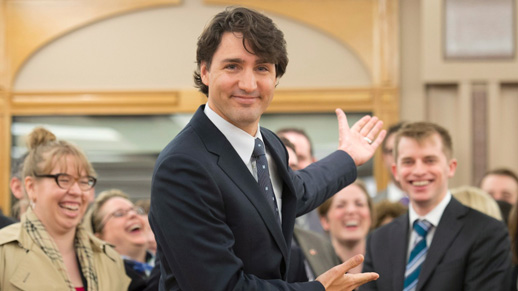
On election night 2011, newly-elected Québec MP Ruth Ellen Brosseau was ridiculed for being out of the country on election night, celebrating her 27th birthday in Las Vegas. Moreover, Ms. Brosseau was attacked in the media and by opposition MPs for never having stepped foot in her Berthier-Maskinongé riding during the entirety of the 35-day election campaign, for being a unilingual English-speaking ‘paper candidate’ — a ‘poteau’ in French slang — in a riding that was, and is, almost universally French speaking.
A 2011 op-ed in the National Post criticized Ms. Brosseau’s inexperience, writing that she was “an extreme example of what happens when people sign up to run for a party with little or no expectation of actually winning.” Yet, despite all, on election night 2011, Ms. Brosseau handily defeated incumbent Bloc Québécois Member of Parliament Guy André, former provincial Liberal MNA Francine Gaudet and three other candidates, winning a plurality, with 22,484 votes, representing 39.3% of all the votes cast.
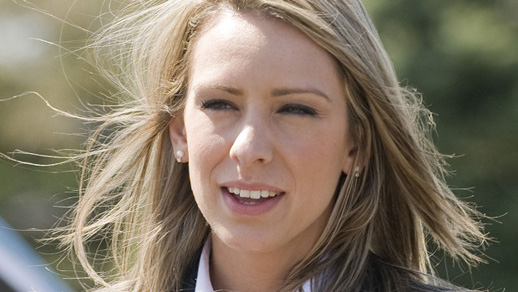
Yet, even given all of the above, and what many in the political class considered to be Ms. Brosseau’s “sordid past”, at the conclusion of 2015’s ruinous for the NDP 78-day election campaign, Ruth Ellen Brosseau — the failed university student and vegetarian single mother turned MP — upped her vote over 2011, raking in 42.24% of the vote, handily defeating all comers, as she secured a second term as MP for Berthier-Maskinongé.
No mean feat that, when the New Democrat Party caucus in Québec was all but decimated, crushed on election night October 19th 2015, as the NDP Québec caucus was reduced from 58 seats out of the province’s 75 seats, to only 16 Québec seats out of 81 seats, of which Ms. Brosseau’s was one.
“I was tagged the ‘Vegas girl’, and hoped from day one that I would lose that identity,” says the now fluently bilingual Brosseau.
“With my win in the 2015 election, the fact that I not only won my riding for a second term, but that I was able to secure more votes and up my percentage win, demonstrates that over the course of the past four years I have gained the trust of the people I’ve been elected to serve — through hard work and being present in my riding for all of my constituents, as their champion and liaison to government, that through my continuing dedication to the people I serve — who like myself, live and work and raise their families in the riding — while working with a first-rate constituency team, together we have been able to accomplish much, to build on our successes, which makes me so, so very happy.”
On the day of Prime Minister Justin Trudeau’s first meeting with his mostly newly-elected 184-member caucus — 156 MPs were elected for the first time — just one day after the Prime Minister and his cabinet were sworn in at Rideau Hall in Ottawa, the Liberal party leader told his party’s MPs …
“I need each and every one of you to remember one thing. Regardless of the committees you’re on, the roles you have, regardless of party demands, and the partisanship that will continue to exist in this House … your one job, that you cannot ever forget, is to be a strong voice in service of the people who sent you here from your constituencies.”
And so it is. As the newly elected rookie MPs, from all parties, set about to get a handle on just what it means to be a member of Parliament, Ruth Ellen Brosseau’s story should become the instructive story of merit, that through it all, through all of the partisanship in the House of Commons and on the Hill, the prime directive always is to “serve your constituents well”, for that is what is going to get you re-elected to a second term in office.
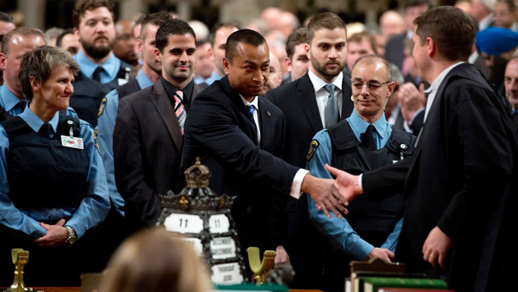
For rookie MPs, the transition to life as a federal politician will no doubt prove ‘educational’, if more than a little daunting, overwhelming and, as they burn the midnight oil, stressful. For rookie MPs must hire staff — both in Ottawa, and in their riding — sign a lease for a constituency office, find a place to live in the nation’s capital, sign up for remuneration and benefits, be briefed on parliamentary protocols, and try not to get lost in the Centre Block in search of the bathroom, among other immediate tasks.
All told, there are 214 new MPs (of which 17 are former MPs but weren’t sitting in the last Parliament) in the 338-seat House of Commons.
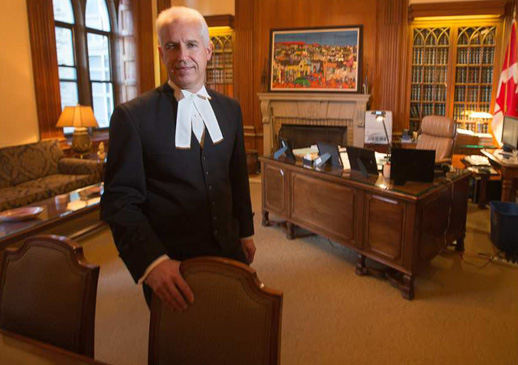
Last week, the newly-elected MPs participated in an administrative orientation session, the first of two being held for new MPs. A second session on parliamentary procedures will be held shortly before the House of Commons sits on December 3rd.
“It can all be quite daunting. There’s a lot of information to absorb. It’s not easy for them to arrive here with all the things happening to them all at once,” said Marc Bosc, acting Clerk of the House of Commons, in an interview with Ottawa Citizen Parliament Hill reporter, Jason Fekete.
“The burden is very heavy. Members’ time is spoken for almost from the minute they arrive here. If it’s not caucus, it’s committee work, or foreign travel, or constituency work. It’s a 24-hour-a-day, seven-day-a-week job if you let it control you to that extent. There’s no limit to the amount of work you can do.”
A multi-party panel of three long-serving and former MPs — re-elected Conservative MP Gordon Brown (Leed-Grenville), former Liberal MP Ted Hsu (Kingston and the Islands), and re-elected New Democrat MP Carol Hughes (Algoma-Manitoulin-Kapuskasing) — held a session last week with the rookies to share their experiences and provide advice.
One of the areas the veteran and former MPs addressed was maintaining a proper work-life balance. Parliament Hill, for many years, has been rife with broken marriages and personal struggles. In the interview with Mr. Fekete, Marc Bosc told the reporter that if he were to offer one piece of advice to new MPs, it would be: Don’t neglect yourself.
“It’s easy when you get here to forget about self care. It’s important to have a good work-life balance, and a lot of MPs have to pay attention to that because it’s easy to get sucked into the vortex of receptions and events, and lose sight of what’s important in your life, whether it be exercise or your family or both,” Bosc said. “Those members who are most successful obviously do a lot of constituency work but they also have some balance and carve out time for themselves and their families.”
Steep learning curve, long days, a committee workload on Parliament Hill (and all that reading) will no doubt cause some of the new MPs to wonder what they’ve gotten themselves into. Some will burn out — which, one would have to think, played some role in the NDP’s loss of 42 seats in Québec — while others will take to their new life as a swan takes to water.
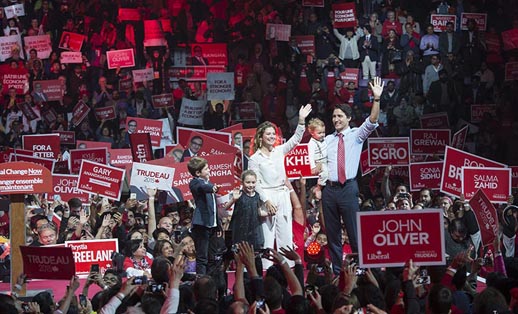
Generational change in Ottawa, gender parity in the new Liberal cabinet, 25,000 Syrian refugees — 47% of whom will be children — on their way to Canada (perhaps, even before year’s end), a new climate change policy, the long overdue end of the war on soft drugs, a new system for electing MPs to Ottawa on the near horizon and certainly in time for the next federal election in 2019, a programme for the realization of new light rail transit infrastructure in our cities, and the promise of an open, transparent and responsive government in Ottawa that will serve the interests of all Canadians — make no mistake, this is an exciting time in Canada’s history, in the lead-up to the 150-year anniversary of our country, in 2017 (the celebration of which has been tasked to Trudeau confidante, Mélanie Joly).
This blush of first love, honeymoon period in the political life of Canada that we’re all experiencing is, for all but the most dour of critics, nothing less than intoxicating. There is governing to be done, and a Canada to be transformed, so that we may recognize, once again, Canada as she is as a nation — recapturing who we once were and who we will be again and will remain, what we stand for as a nation, and the values we hold most dear, not just as a nation but in our warm, collective relations with one another.
We are our sisters and brothers keepers — let us hope and pray that the 214 MPs newly-elected to Ottawa from all parties, as well as the 124 returning Members of Parliament, work together in service of us all, in their constituencies, and in the House of Commons and on Parliament Hill.
For this is our Canada we want to reclaim — for each & every one of us, in every age group, from every ethnic community, from old stock Canadians to immigrants old and new, for every person along the gender variant spectrum, for every woman, man and child for whom Canada is home.